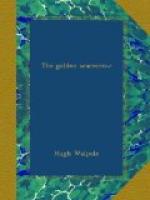Some of the houses can boast the days of good Queen Anne for their period. There is one, at the very corner where Somers Street turns off towards the Park, that was built only yesterday, and has about it some air of shame, a furtive embarrassment that it will lose very speedily. There is no house that can claim beauty, and yet the Square, as a whole, has a fine charm, something that age and colour, haphazard adventure, space and quiet have all helped towards.
There is, perhaps, no square in London that clings so tenaciously to any sign or symbol of old London that motor-cars and the increase of speed have not utterly destroyed. All the oldest London mendicants find their way, at different hours of the week, up and down the Square. There is, I believe, no other square in London where musicians are permitted. On Monday morning there is the blind man with the black patch over one eye; he has an organ (a very old one, with a painted picture of the Battle of Trafalgar on the front of it) and he wears an old black skull-cap. He wheezes out his old tunes (they are older than other tunes that March Square hears, and so, perhaps, March Square loves them). He goes despondently, and the tap of his stick sounds all the way round the Square. A small and dirty boy—his grandson, maybe—pushes the organ for him. On Tuesday there comes the remnants of a German band—remnants because now there are only the cornet, the flute and the trumpet. Sadly wind-blown, drunken and diseased they are, and the Square can remember when there were a number of them, hale and hearty young fellows, but drink and competition have been too strong for them. On Wednesdays there is sometimes a lady who sings ballads in a voice that can only be described as that contradiction in terms “a shrill contralto.” Her notes are very piercing and can be heard from one end of the Square to the other. She sings “Annie Laurie” and “Robin Adair,” and wears a battered hat of black straw. On Thursday there is a handsome Italian with a barrel organ that bears in its belly the very latest and most popular tunes. It is on Thursday that the Square learns the music of the moment; thus from one end of the year to the other does it keep pace with the movement.
On Fridays there is a lean and ragged man wearing large and, to the children of the Square, terrifying spectacles. He is a very gloomy fellow and sings hymn-tunes, “Rock of Ages,” “There is a Happy Land,” and “Jerusalem the Golden.” On Saturdays there is a stout, happy little man with a harp. He has white hair and looks like a retired colonel. He cannot play the harp very much, but he is quite the most popular visitor of the week, and must be very rich indeed does he receive in other squares so handsome a reward for his melody as this one bestows; he is known as “Colonel Harry.” In and out of these regular visitors there are, of course, many others. There is a dark, sinister man with a harmonium and a shivering monkey on a chain; there is an Italian woman, wearing bright wraps round her head, and she has a cage of birds who tell fortunes; there is a horsey, stable-bred, ferret-like man with, two performing dogs, and there is quite an old lady in a black bonnet and shawl who sings duets with her grand-daughter, a young thing of some fifty summers.




